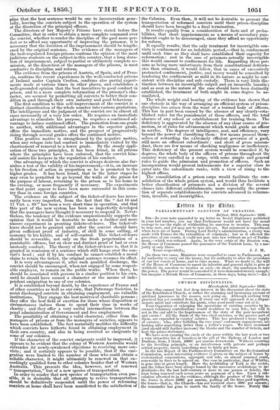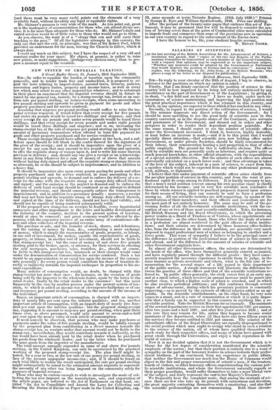CHURCH DIFFICULTIES.
Macclesfield, 25th September 1856. Sin—One cannot but feel deep interest in the discussion about the state of the Established Church, or rather the alarming and increasing amount of spiritual ignorance in the masses, now going on. Although nothing very practical has yet resulted from it, if every one will approach it in a dispas- sionate spirit and contribute his quota, some good must come out of it.
Your suggestion of enlarging the operations of existing societies by in- creased voluntary contributions would doubtless be soon felt but will It not in the end add to the hopelessness of the state of the poor incumbent and curate ? All the funds of the two cited societies, or the greater part of them, are expended in curates' salaries. This has produced a large supply of curates ; who, after fulfilling the two years' customary engagement, are looking after something better than a butler's wages. We have increased (and should still further increase) the blanks and the number of tickets, and kept the prizes stationary.
We have seen running the circle of the press within the last week or two a very attractive list of benefices in the gift of the Bishops of London and Durham, from, I think, 40001. per annum downwards. Without resorting to the levelling principle, or an interference with private and perhaps settled property, surely something may be fairly got here. In the last Report of the Parliamentary Committee on the Ecclesiastical Commission, much interesting evidence i given on the subject of leases by ecclesiastical corporations, aggregate and sole, on almost nominal rents, renewable by fines to be agreed on. One case in particular, that of Whitby, is gone into at great length. Here the Archbishop of York is the rector, and the tithes have been always leased by the successive archbishops to in- dividuals—for the last half-century or more to one person or family, the lease being renewed each seven years on payment of a fine. Upon a cal- culation adverted to in the evidence, although the produce of the tithes to the lessee is above 2500/. per annum, putting all the fines paid together, the lessor—that is, the Church—has not received above 500/. per annum ; the remainder has gone to enrich the family of the lessee. Surely We
(and there must be very many such) points out the elements of a very available fund, without invading any legal or equitable rights. Mr. Skinner's panacea is very wide of the mark. As you point out, great as is the inadequacy of accommodation for those who can attend divine ser- vice, it is far more than adequate for those who do. Mr. Skinner's daily and varied services would be of little value to those who would not go to them. As you observe, the want is of a "clergy that can and will carry their teaching to the poor." Of all the legislative attempts in this century, the only one that met the evil, on principle, was that of Sir Robert Peel, which provided an endowment for the man, leaving the Church to follow, which it always does. I could say much on this subject, but I have the respect of a very old and constant reader for your space. My object, at present, is rather to raise new points, or make suggestions, (perhaps very obvious ones,) than to pro- pose a measure equal to the occasion. B.



































 Previous page
Previous page